HR Healthcare 2025
October 5 - 7, 2025
The Westin Copley Place, Boston MA
Table of Contents
- Executive Summary
- Contributors
- Key Findings
- Research Analysis
-
- Setting the stage: Healthcare leadership in the skills economy
- Addressing the pressures of regulation
- Bridging skill gaps and driving innovations by sourcing talent from the private sector
- The role of technology in healthcare HR management
- Key Recommendations
- Appendices
-
- Appendix A: Methodology
- Appendix B: Demographic Information
- HR Healthcare
- Cornerstone
- WBR Insights
Executive Summary
Faced with a changing competitive landscape marked by M&A activity, increasingly empowered consumers, and the ever-present need to comply with regulations, executives within the healthcare industry are updating their hiring, training and development strategies to keep pace. Creating environments with ample skill-building and learning opportunities, as well as identifying the right talent to meet current challenges are front-of-mind for HR executives in the healthcare industry
What are some of the ways that they are doing this? In order to find out, WBR Insights and Cornerstone have partnered to research how HR strategies in the healthcare industry are evolving to meet the demands of today and beyond. After surveying 119 executives in healthcare HR, a picture of an industry in ux has emerged. Read on to review our research findings, alongside insights contributed by your industry peers.
Featured Contributor

Cathy A. Martin
Vice President of Workforce Policy
California Hospital Association
Additional Contributors
In addition to the benchmark data and analysis contained in this report, several executives and industry experts have contributed their insight via interviews. Selected quotations have been used to add context and color to the statistical information contained in this document. Interviews were centered on benchmark ndings as well as key trends identi ed by research.
Key Findings
Our research has revealed several key trends which are affecting how the healthcare industry approaches talent management today:
First among these key trends are the forces of regulation.
With the increasing administrative complexity in a highly regulated environment, many organizations must adapt their operations to follow this driving force. While many respondents felt neutral or positive about the impact of regulation on their businesses, a similarly large share admit that it is having a signifcant impact on their business, and talent management initiatives must ensure that the workforce has the skill to cope with changes.
While the majority of respondents feel that they have the skills to compete within their organizations today, an even greater number see bene ts in sourcing key talent from the private sector.
HR managers have been building talent within their current organizations for years in some cases. The fact that the majority of respondents are con dent that they have the skills they need within their talent pools is a refection of the success of their current strategies. That said, an even greater majority of respondents are seeking talent from the private sector in the future. This talent can reinvigorate the skillsets within the organization and position leadership for the future, while assisting with critical administrative and managerial tasks.
Satisfaction with current learning platforms is generally average to positive with room for improvement. Keeping an eye on technology can provide an x-factor that allows HR managers to leverage their efforts much more efficiently.
Navigating changes in the healthcare industry and the need to build skillsets internally while blending in those from the private sector requires a solid understanding of the skills that are already present in the workforce. Monitoring the pace of development of the individuals within the organization is just as important. Technology will be key to creating ever-greater ef ciencies and visibility for HR managers as they tailor their efforts. The right learning platforms can make a large difference.
Research Analysis
Setting the stage: Healthcare leadership in the skills economy
Today, the emergence of the “skills economy” has become a driving force for change across industries. Rapidly compounding advancements in technology are placing an ever-greater emphasis on the development of adaptability and learning capacity within the workforce. These developments are needed in order to account for the changes that
broader integrations of AI and machine learning will bring. In the context of healthcare, regulatory compliance, an increasingly powerful role of consumer preference, and the need to embrace metrics that in the past have been associated with the private sector are further reasons to pursue a broad approach to skill building within the workforce.
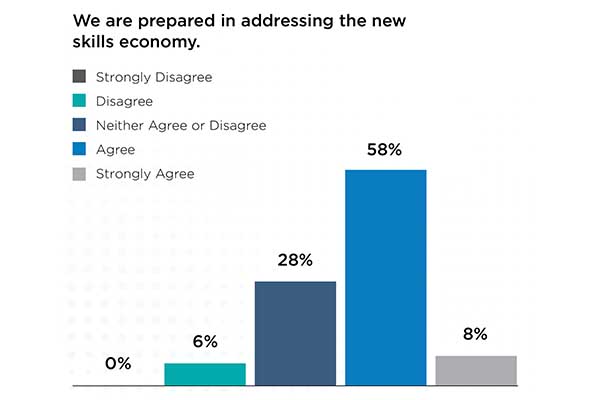
While the majority of respondents state that they are prepared to address the new skills economy, over one third acknowledge that they are not there yet.
In healthcare, the importance of hiring individuals who can enable correct outcomes is paramount. Given the interdependent nature of each part of the organization, healthcare is also perhaps more primed than many industries to foster internal learning cultures. Today, it’s common for personnel to be promoted upwards into administrative roles from a role that may not originally have focused
on administrative or business management tasks. Without additional development, that can have a share of negatives along with positives. In many cases, the introduction of talent with business and administrate skills sets learned in the private sector can go a long way towards improving the ef ciency and core competencies of the entire organization.
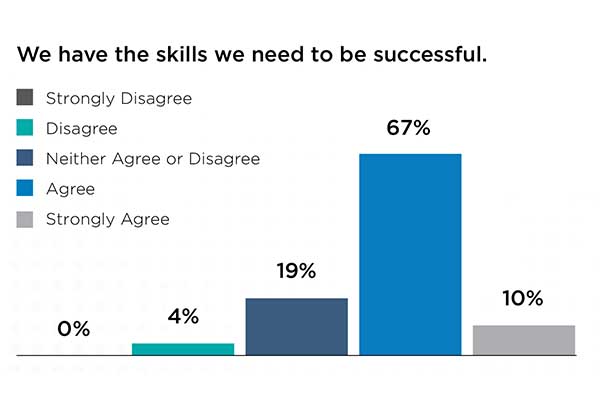
"The available talent pool is very limited and with the scarcity of resources it becomes even more dif cult to bring in new talent. Higher expectation from candidates in this short pool also becomes a very big challenge."
Human Resources Director representing a Mission: Lifeline® Gold Receiving Quality Achievement Award winning Medical Center
Without the skills to be successful in the short term, there is no long term success. Additionally, without building continuous learning into an HR strategy, competitive edge can begin to fade away.
It’s not surprising that 77% of respondents feel their organizations currently have the skills they need to be successful, as the right skills are a baseline prerequisite for performance in any industry. That stated, the fact that one third of respondents cannot af rm they are prepared to address the skills economy indicates that there is still work to be done to adapt to the changing industry. Skill development and hiring the right talent will be critical to sustain the level of aptitude needed to remain competitive.
Addressing the pressures of regulation
The presence of regulations in the healthcare industry adds complexity to the development of talent and skills within the organization. Training for compliance adds another layer of development to the list of attributes that are required in employees
Per the findings of the report, 70% of respondents agreed that regulation dictates their operation. This is especially true in California, where regulations tend to be the most stringent in the nation. This makes it difficult to attract talent from other states. While regulations are necessary and protect patients and consumers, many have been outdated for decades. Modernization of regulations, in addition to harmonization with state and federal requirements, is long overdue. Addressing skill gaps and the deployment of innovation is dependent upon a regulatory environment that is reflective of health care delivery in the 21st century.

Cathy A. Martin
Vice President of Workforce Policy
California Hospital Association
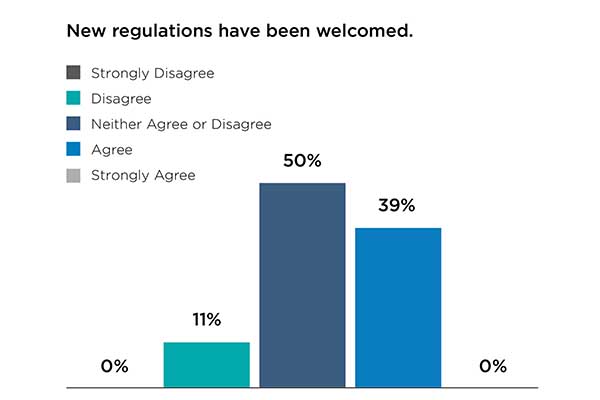
While regulations have not necessarily been rejected or unwelcomed, they undisputedly have a huge impact on how the organization functions.
While half of respondents feel neutrally about the impact of new regulations, 39% have welcomed them as catalysts for positive change. Comparatively few respondents are displeased by regulatory developments.
Hospitals are one of the most regulated sectors in North America and it becomes ground zero for reduced predictability and forecasting of growth due to the frequent regulatory changes which create massive gaps in all strategies.
Director of Talent Acquisition representing a New Jersey based acute care teaching hospital
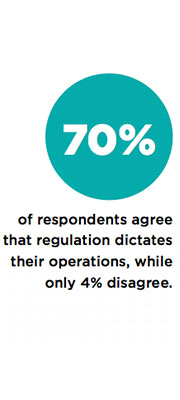
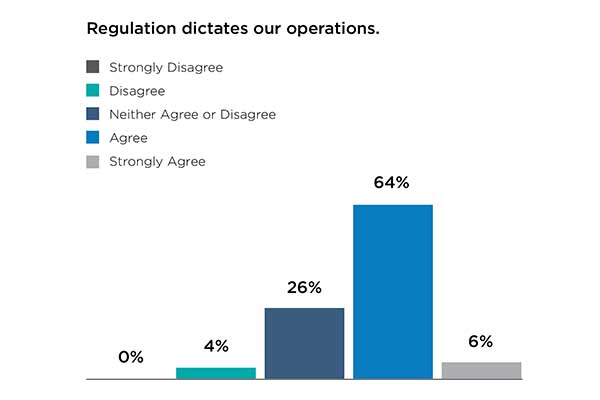
The force of regulation as a change agent is undeniable. While 26% of respondents did not agree or disagree overtly that regulation dictates their operations, the fact that 70% of the industry feels strong pressure to conform their strategies around regulatory development means that even those who are isolated from overt regulatory challenges will feel the effects of their peers’ transformations.
Bridging skill gaps and driving innovations by sourcing talent from the private sector
How are HR executives ensuring that their organizations have the skills they need to contend with their changing industries? The talent pipeline within the organization must be strong, and an emphasis on continuous learning and training certainly helps in this regard. In order to ll managerial positions that demand business-speci c knowledge, it can pay to bring talent in to the organization from the private sector.
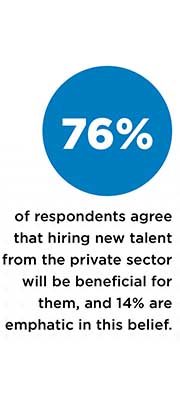
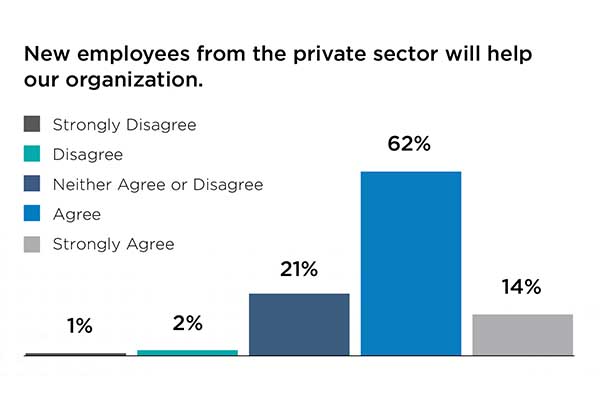
An overwhelming number of respondents are con dent that new employees from the private sector will help their organizations. In fact, only 3% disagree that new talent has a role to play in the development of their talent pools.
The role of technology in healthcare HR management
Technology can play a large role in responding to the internal pressures created by demand for skill development and training. For the majority of respondents, skill development platforms are already making a difference, re ected by a generally favorable perception.
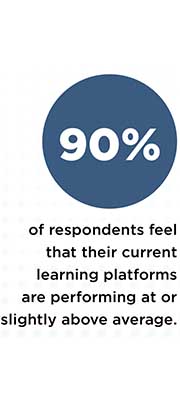
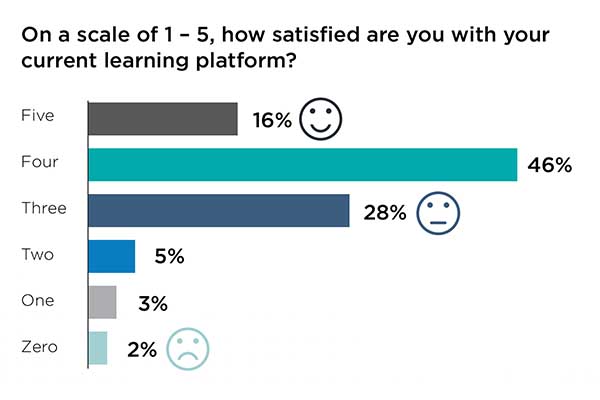
Key Recommendations
What are the next steps that HR executives should take to maximize their future performance? Here are several areas to focus on that can help your organization remain prepared and invigorated with a solid base of skills and talent.
The time is now to promote a culture of continuous learning within your organization.
While retaining and promoting talent from within is a common practice of many healthcare systems, it’s important that organizations remain attentive to the development and sharing of skills across these employee journeys.
In order to manage consistent regulatory pressures, consider bolstering administrative forces within the organization with private sector talent.
As the healthcare industry responds to pressures from regulation, as well as from their increasingly well-informed patients and customers, the need for administrative and managerial skillsets increases. For this reason, many are looking to bring in managerial talent from the private sector to broaden the skill base of their organizations as well as overhaul bureaucratic processes for ef ciency.
Adopt the talent management solutions to enable your organization to compete within the skills economy.
Leveraging tools that can identify high-potential talent, as well as catalog the skills and learning underway across the organization makes it much easier for HR and talent managers to vouchsafe continued effectiveness.
Appendices
Appendix A: Methodology
The results analyzed in this report were gathered from responses to a digital benchmarking survey delivered to an audience of HR and Talent Management executives within the healthcare industry. 119 executives responded to the survey. Interviews with sources were conducted after survey data was compiled, and centered on discussion of benchmark results.
Appendix B: Demographic Information
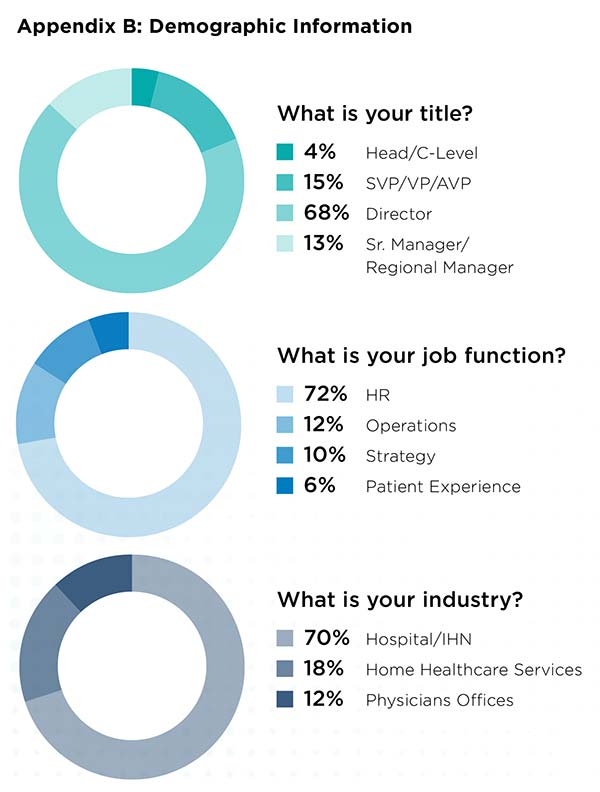
About Us
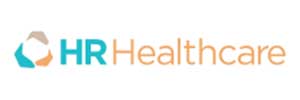
HR Healthcare
WBR’s HR Healthcare is a forum for 200 healthcare HR innovators to share, network, and learn. Sessions are focused on attendee collaborating in pushing forward workforce efforts that keep apace with rapidly changing healthcare landscape. While working with WBR’s healthcare audience from our Next Generation Patient Experience event, HR Healthcare addresses the pressures healthcare HR professionals are under to revitalize recruitment, employee engagement, and development to meet patient needs. WBR is an HRCI accreditation provider.
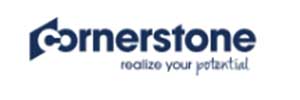
Cornerstone
Cornerstone OnDemand (NASDAQ: CSOD) is pioneering solutions to help organizations realize the potential of the modern workforce. As a global leader in cloud-based human capital management software, Cornerstone is designed to enable a lifetime of learning and development that is fundamental to the growth of employees and organizations. From recruitment, onboarding, training and collaboration, to performance management, compensation, succession planning, people administration and analytics, Cornerstone is there at every phase of the employee lifecycle.
Cornerstone is a single, uni ed solution that is completely con gurable to meet the talent strategy, compliance, business and work ow needs of an organization. Cornerstone works with corporations of all sizes, government agencies, hospitals, nonpro ts and schools. Our software and services are used by more than 3,200 clients worldwide, spanning more than 35 million users across 192 countries and 43 languages.
For more information, visit www.cornerstoneondemand.com federal-government or www.cornerstoneondemand.com/state-local, follow us on Twitter @CornerstoneInc and like us on Facebook at facebook.com/CSODcommunity.
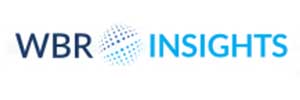
WBR Insights
We are a team of writers, researchers, and marketers who are passionate about creating exceptional custom content. WBR Insights connects solution providers to their targeted communities through custom research reports, engaged webinars, and other marketing solutions. Learn more at www.wbrinsights.com